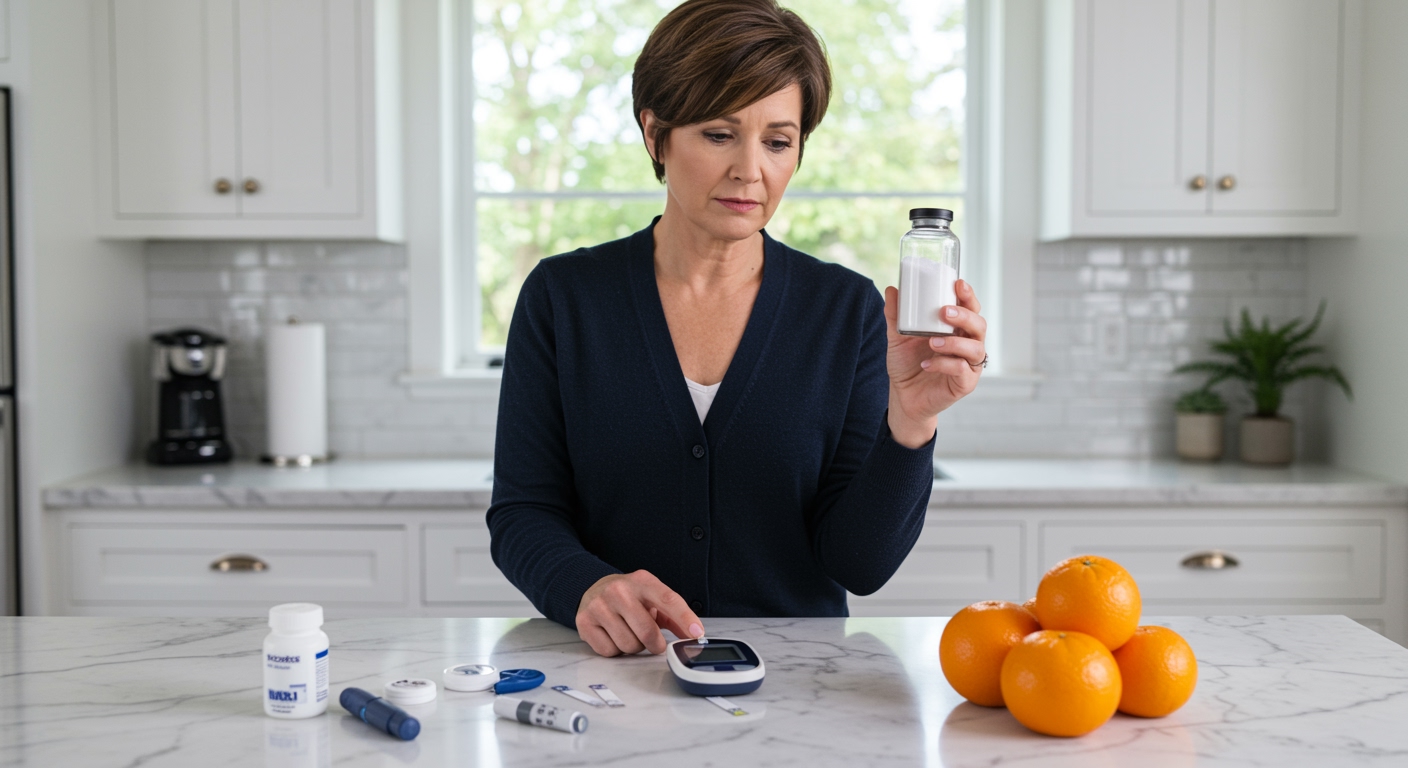✪ Key Takeaway: Dextrose raises blood sugar rapidly and should be avoided by diabetics except during hypoglycemic emergencies.
Introduction
You grab a sports drink after your workout and notice dextrose listed as the second ingredient.
Your mind races with questions about whether this simple sugar will send your blood glucose levels through the roof.
Hi, I am Abdur, your nutrition coach and today I am going to explain exactly how dextrose affects your diabetes and when it might actually save your life.
What Exactly Is Dextrose And How Does It Work?
Dextrose is a simple sugar that your body absorbs faster than any other carbohydrate.
This white crystalline powder is chemically identical to glucose, which means it enters your bloodstream within minutes of consumption.
Your digestive system does not need to break down dextrose because it already exists in the exact form your cells use for energy.
When you consume dextrose, it bypasses the normal digestion process and goes straight into your bloodstream through your small intestine.
This rapid absorption causes your blood sugar to spike within 15 to 20 minutes, making it the fastest-acting carbohydrate available.
Your pancreas responds to this sudden glucose surge by releasing a large amount of insulin to help your cells absorb the sugar.
For people with diabetes, this process becomes problematic because their bodies either do not produce enough insulin or cannot use it effectively.
✪ Fact: Dextrose has a glycemic index of 100, making it the reference point for measuring how quickly other foods raise blood sugar.
Why Do Doctors Use Dextrose For Diabetic Emergencies?
The same property that makes dextrose dangerous for daily diabetes management makes it lifesaving during hypoglycemic episodes.
When your blood sugar drops below 70 mg/dL, you experience hypoglycemia, which can lead to confusion, seizures, or even coma if left untreated.
Emergency medical professionals use dextrose injections because they need to raise blood sugar levels immediately to prevent brain damage.
Your brain depends entirely on glucose for fuel and cannot function properly when blood sugar levels drop too low.
Dextrose tablets or gels work faster than regular food because they do not require digestion or breakdown.
Many diabetes educators recommend keeping dextrose tablets on hand for treating mild to moderate hypoglycemia at home.
The standard treatment involves consuming 15 grams of dextrose, waiting 15 minutes, then rechecking your blood sugar levels.
✪ Pro Tip: Always carry dextrose tablets if you take insulin or diabetes medications that can cause low blood sugar.
How Does Dextrose Compare To Other Sugars For Diabetics?
Dextrose raises blood sugar faster and higher than table sugar, honey, or fruit sugars.
Regular table sugar contains both glucose and fructose, which means your body must first separate these components before absorption.
This extra step slows down the blood sugar response compared to pure dextrose.
Fructose from fruits gets processed primarily by your liver and has less immediate impact on blood glucose levels.
Complex carbohydrates like whole grains take even longer to affect blood sugar because they require extensive digestion.
Research shows that dextrose can raise blood sugar levels by 50 to 100 mg/dL within 30 minutes in people with diabetes.
This dramatic spike makes dextrose particularly dangerous for people trying to maintain stable blood sugar throughout the day.
✪ Note: Even small amounts of dextrose can cause significant blood sugar spikes in people with poorly controlled diabetes.
Where Do You Find Hidden Dextrose In Your Diet?
Food manufacturers add dextrose to countless products because it dissolves easily and provides instant sweetness.
Sports drinks, energy bars, and workout supplements commonly contain dextrose to provide quick energy for athletes.
Many processed foods use dextrose as a preservative or to enhance flavor, even in products that do not taste particularly sweet.
Baked goods, candies, and desserts often list dextrose among their first few ingredients.
Some medications and vitamins contain dextrose as a filler or to improve absorption of active ingredients.
Reading ingredient labels becomes crucial because dextrose can appear under different names like glucose or corn sugar.
Even small amounts from multiple sources throughout the day can add up to significant blood sugar challenges for people with diabetes.
✪ Pro Tip: Check ingredient lists on all packaged foods, as dextrose often hides in unexpected places like salad dressings and crackers.
What Are The Long-Term Risks Of Regular Dextrose Consumption?
Regular dextrose consumption can worsen insulin resistance and make diabetes management increasingly difficult over time.
Your pancreas works overtime to produce enough insulin to handle repeated blood sugar spikes from dextrose intake.
This constant stress can lead to pancreatic beta cell burnout, reducing your body’s natural ability to produce insulin.
Frequent blood sugar spikes also damage your blood vessels, increasing your risk of heart disease, stroke, and kidney problems.
The rapid rise and fall of blood glucose levels can cause energy crashes, mood swings, and increased cravings for more sugar.
Studies link regular consumption of fast-absorbing sugars like dextrose to faster progression of diabetic complications.
Weight gain often accompanies frequent dextrose consumption because excess glucose gets stored as fat when your cells cannot absorb it all.
✪ Fact: People with diabetes who regularly consume high-glycemic foods like dextrose have higher HbA1c levels and worse long-term outcomes.
The Bottom Line
Dextrose is not good for diabetes management and should be avoided in your daily diet except during hypoglycemic emergencies.
Your health is not a convenience store where you can grab quick fixes without paying the long-term price.
I would love to hear about your experiences with managing blood sugar or any questions you might have about dextrose and diabetes in the comments below.
References
At NutritionCrown, we use quality and credible sources to ensure our content is accurate and trustworthy. Below are the sources referenced in creating this article:
- WebMD: What to Know About Dextrose
- MedicineNet: Is Dextrose Bad for Your Health
- PubMed: Glucose and Diabetes Research
- Mayo Clinic: Dextrose Oral Route Description





